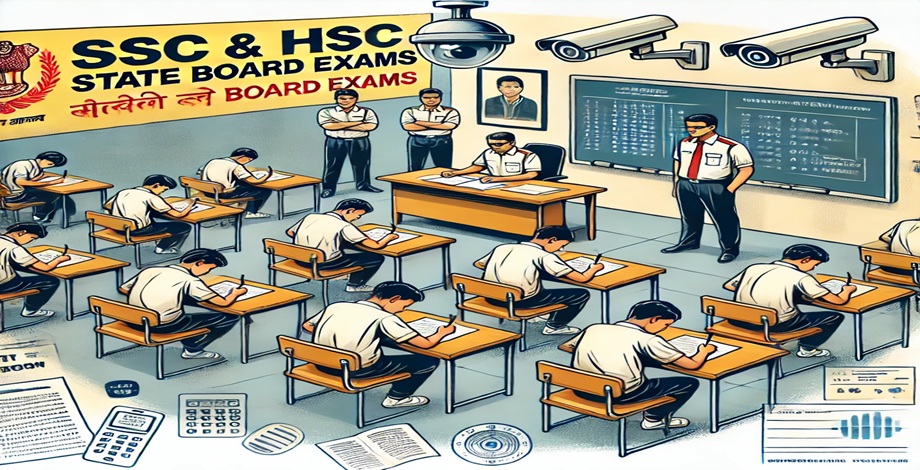Get all the latest information on Events,
Sales and Offers. Sign up for newsletter today.
Are Students Ready for an Expanded Curriculum? New Challenges for Class 9th and 10th

Over the years, discussions and new curriculum drafts have highlighted a growing burden on students, especially those in Class 9th and 10th. The number of subjects they need to study is increasing, with students now expected to study as many as 15 subjects. This trend is raising concerns about the pressures students face, as they juggle a packed schedule that includes school, tuition, and entrance exam preparation.
Currently, students in Class 9th and 10th have 7 general subjects, but under the new curriculum framework, they will be evaluated on 12 subjects. Out of these, 10 will be graded with marks, and the remaining two will be assessed through a grading system.
Vocational and Interdisciplinary Education
One of the major changes is the compulsory inclusion of vocational education, arts, and interdisciplinary studies. This will add three new subjects to the core list, which already includes languages, mathematics, science, history, politics, geography, economics, and physical education. Additionally, scouts and guides training has been made mandatory for all students.
Under the new system, students will also be introduced to vocational education. In Class 9th, students may receive training in fields such as farming, water repair, beauty, cleanliness, and business skills. In Class 10th, vocational training will expand to include gardening, carpentry, nursing, and other trades. Art education will be another key component, with students learning visual arts, drama, music, dance, and folk art. Their evaluation in these subjects will be based on a variety of factors including presentations, teacher observations, self-assessments, and group performances.
Increase in School Hours
This increase in subjects will undoubtedly impact the school timetable. Schools will now have to adjust to accommodate these changes, which means longer school hours. Morning sessions will start at 7 am and run until 12.20 pm. However, some teachers are concerned that even with the extended schedule, there won’t be enough time to cover all the subjects thoroughly. They worry that subjects like mathematics and science will receive less attention compared to social sciences, which could affect the quality of education.
Timetable Challenges and Subject Prioritization
Many schools are struggling to create a timetable that balances the need to cover all subjects fairly. One headteacher mentioned that while the second semester may bring more engaging topics for students, the lack of time for core subjects could be a serious issue. Teachers have raised concerns that the current planning might leave insufficient time for key subjects, particularly in Class 10th, where state-level board exams take place.
Jaywant Kulkarni, a teacher, pointed out that the proposed timetable gives less time to subjects like mathematics and science, which could have long-term effects on students’ performance in these critical areas. He questioned whether the new topics being introduced are truly necessary as standalone subjects or if they could be integrated into the existing framework.
Conclusion
As the number of subjects continues to increase, both students and teachers will face new challenges in adapting to the heavier workload and longer school hours. While vocational and art education offers students a broader learning experience, concerns remain about the ability to balance these new topics with the core academic subjects that are crucial for exams and future career prospects. Schools will need to carefully plan their timetables to ensure that all subjects are given the attention they deserve.
Related Tags
Comments
Search
Recent Posts

NEET-UG 2024 Paper Analysis: Detailed Exam Review, Difficulty Level
January 21, 2025

JEE Main 2025 Session 1: Revised Examination Centre in UAE. Check Details Here
January 21, 2025

Maharashtra State Board: New Measures for SSC, HSC Board Exams
January 20, 2025

JEE Main 2025 Session 1 Admit Card Out Now: Check Step-By-Step Process
January 20, 2025

CBSE Opens Portal for Uploading Internal Grades for Class 12 Students
January 18, 2025
Recent Posts

NEET-UG 2024 Paper Analysis: Detailed Exam Review, Difficulty Level
January 21, 2025

JEE Main 2025 Session 1: Revised Examination Centre in UAE. Check Details Here
January 21, 2025

Maharashtra State Board: New Measures for SSC, HSC Board Exams
January 20, 2025

JEE Main 2025 Session 1 Admit Card Out Now: Check Step-By-Step Process
January 20, 2025

CBSE Opens Portal for Uploading Internal Grades for Class 12 Students
January 18, 2025




You need to log in before you can comment or reply